|
|
|
Sort Order |
|
|
|
Items / Page
|
|
|
|
|
|
|
| Srl | Item |
| 1 |
ID:
157729
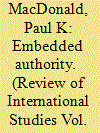

|
|
|
|
|
| Summary/Abstract |
Relations of sovereign inequality permeate international politics, and a growing body of literature grapples with the question of how states establish and sustain hierarchy amidst anarchy. I argue that existing literature on hierarchy, for all its diverse insights, misses what makes hierarchy unique in world politics. Hierarchy is not simply the presence of inequality or stratification among actors, but rather an authority relationship in which a dominant actor exercises some modicum of control over a subordinate one. This authority relationship, moreover, is dramatically different than ones found in domestic hierarchies. It is shaped less by written laws or formal procedures, than by subtle forms of manipulation and the development of informal practices. For this reason, hierarchy cannot simply be reduced the to the dynamics of anarchy, and must be viewed as a relational phenomenon. Ties between actors create positions that permit dominant actors to appropriate and orchestrate the sharing of authority with subordinate intermediaries. This article develops this relational network approach, highlighting how concepts such as access, brokerage, and yoking can illuminate the processes by which authority is enlisted and appropriated in world politics.
|
|
|
|
|
|
|
|
|
|
|
|
|
|
|
|
| 2 |
ID:
164455


|
|
|
|
|
| Summary/Abstract |
By championing certain actors over others, International Relations (IR) theory conventionally avoids questions of agency and does not, at least in theoretical terms, discuss which entities can develop capacities needed to act in world politics. Whether it is states, institutions, or individuals, we simply “locate” agency in particular entities, which then exist and act as global governors qua definition. In other words, agency is determined by a priori claims and we rarely reflect the dispositions needed to be(come) an actor in the first place. Even global governance, despite its impetus to consider agency beyond the state, has not engaged in such a discussion, at least not in theoretical terms. In order to initiate such a discussion, the paper draws on the distinction between substantialism and relationalism. After reviewing how agency has been framed in IR, the paper outlines three general dispositions of agency and relates those to the two ontological perspectives. Based on this theorization, the paper contents that IR's lack of reflection and its substantialized notions of agency, whether in rationalist or constructivist appearance, remain problematic. As such, there is potential to conceptualize agency in world politics not as an inherent disposition of entities but rather as emerging from social relations between them. Such a framework compels researchers to not just assume discrete actors but to focus on relational processes through which their agency emerges in the first place and sustains over time. Reconstructing these processes reveals their political nature and allows us to consider who should govern the world.
|
|
|
|
|
|
|
|
|
|
|
|
|
|
|
|
| 3 |
ID:
158650
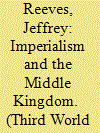

|
|
|
|
|
| Summary/Abstract |
This article applies the Nexon/Wright concept of ideal-type empire to the study of China’s post-2012 peripheral relations to demonstrate that the Xi administration is engaged in a concerted imperialist policy towards its developing neighbour states. Using the Nexon/Wright framework, the article demonstrates how the establishment of a China-centric regional network structure undergirds the Xi administration’s key foreign policy concepts and how these concepts, in turn, inform China’s bilateral relations with its peripheral states. To demonstrate how China employs imperialist tactics to its pursuit of a regionally based order, the article examines China’s bilateral relations with the developing states on its periphery: Mongolia, Kazakhstan, Tajikistan, Kyrgyzstan, Afghanistan, Pakistan, Nepal, Myanmar, Cambodia, Lao PDR and Vietnam.
|
|
|
|
|
|
|
|
|
|
|
|
|
|
|
|
| 4 |
ID:
152723


|
|
|
|
|
| Summary/Abstract |
Practices are capturing increased interest in international relations. Throughout this article, I demonstrate that the body of work under review contributes to a progressive research agenda in world politics. As such, the high quality of the books under review attests to the dynamism of the practice turn. This review puts forward two main arguments. First, I distinguish at least four different forms of a practice approach on display in the reviewed books. Second, I suggest that practice is an essentially contested concept. Overall, this review article highlights some trends flowing from these books as well as some questions that remain either underdeveloped or unanswered.
|
|
|
|
|
|
|
|
|
|
|
|
|
|
|
|
| 5 |
ID:
148034
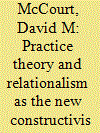

|
|
|
|
|
| Summary/Abstract |
In this theory note, I address two new approaches in international relations theory gaining adherents and producing insightful applications: practice theory and relationalism. Practice theory draws attention to everyday logics in world politics. It stresses how international actors are driven less by abstract notions of the national interest, identities, or preferences than by context-dependent practical imperatives. Relationalism rejects the idea that entities—like states and international organizations—are the basic units of world politics. It replaces them with a focus on ongoing processes. Noting similarities in their arguments to those advanced by early constructivists, I argue that, taken together, practice theory and relationalism represent the New Constructivism in International Relations (IR). A practice–relational turn became necessary because the meaning of constructivism narrowed over time, becoming tied to a specific scientific ontology focusing on the role of identity, norms, and culture in world politics. This ontology unduly narrowed constructivism’s theoretical lenses, which practice theory and relationalism productively reopen.
|
|
|
|
|
|
|
|
|
|
|
|
|
|
|
|
| 6 |
ID:
182454
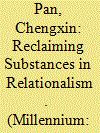

|
|
|
|
|
| Summary/Abstract |
The relational turn in International Relations (IR) has made important contributions by challenging the substantialist claim to substance/thing as ontological primitives, by drawing much-needed attention to relations as ontologically fundamental, and by introducing a diversity of relational ways of being/becoming, knowing and doing. Yet, while rightly repudiating substantialism, the relational turn has remained ambivalent about the concept of substance itself, leaving open an important question: How should we understand substance within a relational ontology? As a result, we are left with different and sometimes confusing positions on the issue of substances vis-à-vis relations. Seeing this gap as a missed opportunity for relationalism in IR, this article seeks to bring substance back in without falling back into substantialism. It draws on a quantum conception of substance via the idea of quantum holography (QH) and its related notion of whole-part duality, and stresses the little-understood dual and inseparable nature of substance-relation (‘relatance’). The concept of substance-relation duality not only enriches our relational thinking, but also allows us to engage in relational analysis through a reimagined notion of substance. To illustrate, the article turns to a substance-based relational analysis of US-China relations.
|
|
|
|
|
|
|
|
|
|
|
|
|
|
|
|
| 7 |
ID:
168763
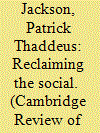

|
|
|
|
|
| Summary/Abstract |
Even in the North American and European context, relationalism comes in many flavours. We identify the common features of relational approaches, including varieties of practice theory, pragmatism and network analysis. We also identify key disagreements within relationalism, such as the relative explanatory importance of positional and process-oriented analysis. Our discussion reveals the problems that come from associating relationalism solely with other clusters of international-relations theory, such as constructivism. It also allows us to construct a typology of major relational frameworks in the field, and provides a better foundation for comparing and contrasting Chinese and Western relationalisms.
|
|
|
|
|
|
|
|
|
|
|
|
|
|
|
|
| 8 |
ID:
187535


|
|
|
|
|
| Summary/Abstract |
Ontological parochialism persists in International Relations (IR) scholarship among gestures towards relational ontological reinvention. Meanwhile, the inter-polity relations of many Indigenous peoples pre-date contemporary IR and tend to be substantively relational. This situation invites rethinking of IR's understandings of political order and inter-polity relations. We take up this task by laying out necessary methodological innovations to engage with Aboriginal Australia and then showing how conventional and much recent heterodox IR seek to create forms of ‘escape’ from lived political relations by asserting the powerful yet problematic social science mechanism of observer's distance. This demonstrates a need to take Aboriginal Australia as a system on its own terms to speak back to IR. We next explain how Aboriginal Australian people produce political order on the Australian continent through a ‘relational-ecological’ disposition that contrasts with IR's predominant ‘survivalist’ disposition. The accompanying capacity to manage survivalism through relationalism provides an avenue for engaging with and recasting some of mainstream IR's survivalist assumptions, including by considering an Aboriginal approach to multipolarity, without attempting ‘pure escape’ through alternative ontologies. We thus argue that while it is necessary to critique and recast dominant IR, doing so requires putting dominant IR and Indigenous understandings into relational exchange.
|
|
|
|
|
|
|
|
|
|
|
|
|
|
|
|
| 9 |
ID:
167203
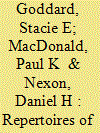

|
|
|
|
|
| Summary/Abstract |
Issues involving ‘statecraft’ lie at the heart of most major debates about world politics, yet scholars do not go far enough in analyzing how the processes of statecraft themselves can reshape the international system. We draw on the growing relational-processual literature in international relations theory to explore how different modes of statecraft can help create and refashion the structure of world politics. In particular, we argue that scholars should reconceive statecraft in terms of repertoires. An emphasis on repertoires sheds light on a number of issues, including how statecraft influences patterns of technological innovation, the construction of institutional and normative orders, and the pathways through which states mobilize power in world politics.
|
|
|
|
|
|
|
|
|
|
|
|
|
|
|
|
| 10 |
ID:
160884
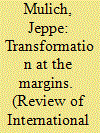

|
|
|
|
|
| Summary/Abstract |
Taking the phenomenon of empire as its starting point, this article seeks to provide a framework for addressing the question of how and why international systems change over time. Synthesising elements from network-relational analysis and practice theory, I argue that international systems are best thought of as being composed of multiple partially overlapping and interrelated hierarchical networks. These networks are made up of social ties – as in classic network analysis – but also of specific repertoires of practice. Systemic transformations happen through the reconfiguration of networks, both through shifts in social ties and through changes in their practices. Empire provides a particularly illuminating window into the topic of systemic change, in part because a major driver of historical transformations has been the expansion of empires and their encounters with other heterogeneous polities across the globe, and in part because a focus on imperial interactions highlights the limitations of existing unit-centric perspectives. Drawing on examples from the nineteenth century, I illustrate the usefulness of the framework by showing how different regionally anchored systems came into contact with the expanding spheres of Western empires and how such points of interaction contributed to the development of an increasingly global international system.
|
|
|
|
|
|
|
|
|
|
|
|
|
|
|
|
| 11 |
ID:
100199
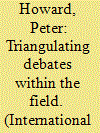

|
|
|
|
|
| Publication |
2010.
|
| Summary/Abstract |
Undergraduate introductory methods courses offer a unique opportunity to bring methodological pluralism to the field by teaching students multiple approaches to research. This article presents one way to organize an introductory undergraduate research methods course. By focusing on central debates between methodological approaches on issues of causality, context, and essentialism, an instructor can introduce positivism, interpretivism, and relationalism as distinct, coherent methodological approaches to research. Depicting these three debates and three approaches graphically on a triangle can illuminate some core methodological debates within the field today. It also illuminates the methodological underpinnings of many of the discipline's theoretical debates.
|
|
|
|
|
|
|
|
|
|
|
|
|
|
|
|
| 12 |
ID:
175552


|
|
|
|
|
| Summary/Abstract |
Spheres of influence remain one of the most pervasive phenomena in the practice and history of international relations, yet only rarely have they been taken up analytically. To bring conceptual and discursive clarity, this article advances two arguments. First, it argues that spheres of influence are not a distinct form of hierarchy in international relations, but rather practices of control and exclusion that can be found within any ideal-type hierarchy. Second, these hierarchical practices are generally underspecified by those invoking the term. Different theoretical perspectives on international relations offer highly divergent ways of understanding control and exclusion, and all do so with plausible empirical mooring. Spheres of influence do not themselves denote a form of governance even if it does a form of order construction and maintenance. Any given empire, hegemonic order, or alliance may also be a sphere of influence depending on the practices that occur; the key is not to identify whether particular hierarchical traits are dispositive of one of these relational structures, but rather whether, and the extent to which, assertions of control and exclusion define the hierarchy.
|
|
|
|
|
|
|
|
|
|
|
|
|
|
|
|
| 13 |
ID:
155155
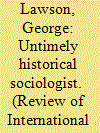

|
|
|
|
|
| Summary/Abstract |
This article examines the historical sociology that informs Andrew Linklater’s Violence and Civilization in the Western States-Systems. On the sociological side, it critically assesses Linklater’s use of Elias and Wight, arguing that his ‘higher level synthesis’ is internally incompatible. On the historical side, the article argues that the occlusion of the transnational interactions that, in great measure, drive historical development means that Linklater’s analysis is inadequate for its stated purpose: to chart the development of civilising processes within the Western state-systems.
|
|
|
|
|
|
|
|
|
|
|
|
|
|
|
|
|
|
|
|
|